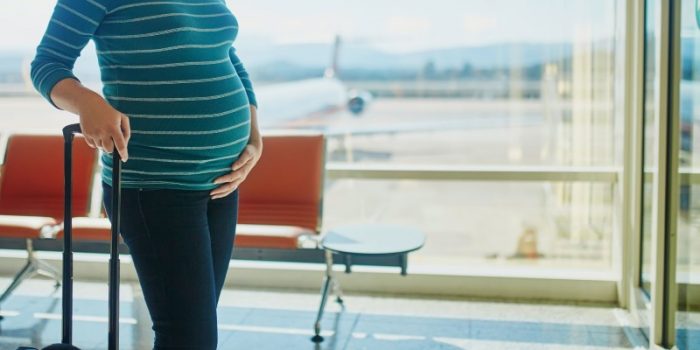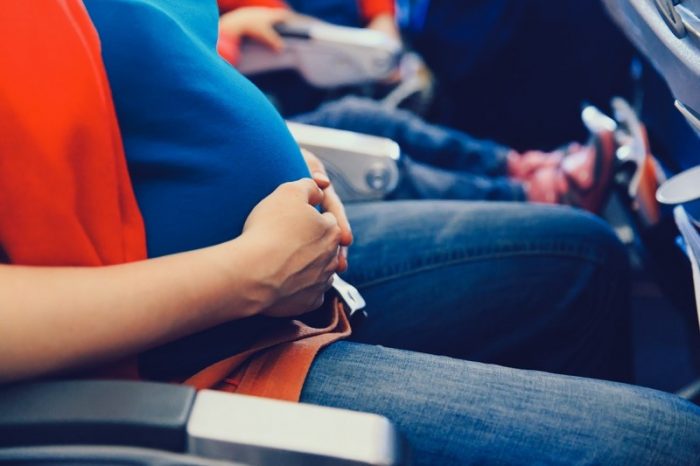
Image from The New Times Publication
Traveling while pregnant was often thought in the past to be a no-no, due to safety reasons. But doctors say flying while pregnant is as safe as flying when you are not pregnant. You just need to take extra precautions to make sure that you and your baby on board will have a safe and comfortable journey.
But take note that the safety of traveling while pregnant depends on the state of your pregnancy. And consulting your doctor first is the key. For your reference, here are some of the precautionary measures doctors suggest to take for traveling pregnant woman, plus additional helpful tips that they should take.
Traveling While Pregnant: Tips for a Safe and Comfortable Trip
1. Consider timing.
According to Dr. Kimberly Langdon, an OB/GYN and medical adviser from the San Francisco Bay Area, the optimal time to travel when pregnant is between 16 and 24 weeks or four to six months of pregnancy.
This is because medical emergencies usually happen during the 1st and 3rd trimesters. This is also the best time to travel, because morning sickness often subsides during this time. It’s also easier to move around in this time frame.
“Some obstetricians recommend avoiding air transportation after 32 weeks primarily for comfort reasons, especially on long flights,” Dr. Langdon added.
2. Check the airline’s policy.
Aside from speaking with your healthcare provider first before planning a trip, you should also check your airline’s policy for pregnant travelers before booking a flight. Because some airlines have special regulations when it comes to pregnant travelers, like requiring a note from your doctor saying that it’s safe for you to fly.
According to Dr. Michael Cackovic, an obstetrician-gynecologist from The Ohio State University, he pointed out that most airlines allow passengers to fly up to 36 or 37 weeks into a pregnancy. But he always advised his healthy pregnant patients to consider not traveling by air after 36 weeks to lessen the risk of going into labor mid-flight.
3. Beware of health complications.
Pregnant woman should also consider their health status before traveling. This is especially true for those who are experiencing complications that need to be monitored by their doctors.
“Always touch base with your OB/GYN to make sure it’s ok to fly.” This is advice given by Dr. Angela Jones, an OB/GYN.
“If you are considered a ‘high risk’ pregnancy for whatever reason (high blood pressure, multiple gestations, preterm labor, etc.), you will need to get clearance from your OB/GYN, or may even be advised against traveling so far away from your home base”, she added.
4. Try natural solutions to alleviate discomfort when traveling pregnant.
When flying, it is common to experience discomfort like nausea, headaches, and digestive issues. And to help ease these symptoms while traveling, Dr. Cackovic advises to use natural solutions. Have some ginger and peppermint aromatherapy, for example, that can help alleviate nausea. Sucking on mints or ginger candies can also help settle the stomach.
Wearing a Sea-Band around the wrists can also help to ease motion sickness by pushing pressure points that help take the mind off nausea.
One important piece of advice he also mentioned in order to be properly hydrated is to avoid certain foods and drinks.
“I always tell patients to eat normally but avoid such things as spicy foods, caffeinated drinks, tomatoes, citrus, and chocolate, as they can exacerbate the gas and heartburn associated with pregnancy,” Cackovic explains.
5. Bring your own snacks and disinfecting wipes.
To make sure that your flight will be safer and healthier, doctors advise to bring your own snacks and disinfecting wipes. Healthy snacks like granola bars, apples, dried fruit, and homemade trail mix are the best food items to bring. But, it is better to eat first before heading to the airport.
For beverages, the best choices are bottled water and non-citrus juices. Avoid drinking tap water, coffee, and tea when traveling, because the water used in these drinks is usually stored in tanks on the plane. The water can be filled with bacteria and is not considered safe for expectant moms.
Bringing a pack of antibacterial wipes is also a wise move to protect yourself from germs. You can use it to wipe your hands before eating or to wipe the tray tables that were used by many travelers but seldom get disinfected.

Image from The Points Guy
6. Use the best practices for staying safe en route.
For additional tips, doctors suggest practices for women that are traveling while pregnant to ensure comfort and their safety.
- Stand up every hour or two to stretch or do calf exercises. This can help to prevent blood clots, while wearing a compression stocking is also a good idea.
- Wear comfortable, loose clothing.
- Fasten your seat belt below the hip bones, and wear it when seated in case of unexpected turbulence.
- Don’t eat gas-producing foods and drinks to prevent discomfort.
- Avoid dehydration and drink plenty of fluids. But one side effect to observe is the need to go to the bathroom frequently. So, take advantage of restrooms when they are accessible.
- Always carry a copy of your prenatal record with you. This will be a very big help in case an emergency happens and you need to see a doctor or visit a hospital while traveling.
Traveling while pregnant should not be a burden for any healthy woman. You just need to follow some precautions from your doctor to ensure that you’ll have a safe, comfortable, and enjoyable trip while having your baby.
































